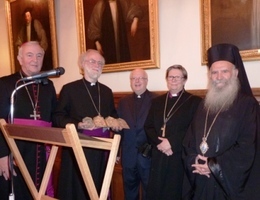Archbishop's Ecumenical Letter to Churches
 L-R: Archbishop Vincent Nichols, Archbishop Rowan Williams, Revd Michael Heaney, Bishop Jana Jeruma-Grinberga, Archbishop Gregorios
L-R: Archbishop Vincent Nichols, Archbishop Rowan Williams, Revd Michael Heaney, Bishop Jana Jeruma-Grinberga, Archbishop GregoriosFriday 21st December 2012
In his ecumenical Christmas Letter to the heads of other Churches and Christian world communions, Archbishop Rowan Williams speaks of the plight of displaced persons where the loss of home, security and citizenship means an increased risk of violence, abuse, hunger, disease and death."Jesus and his family knew this tragedy of homelessness", says the Archbishop. "Our following Jesus means following him beyond the frontier of our comfort, following him to where we shall meet other exiles, others who are homeless and rejected."
"Spiritually, we must prepare ourselves for the journey, stripping away the trivial and comfortable habits that all of us develop in our practice of faith, and renewing our commitment to follow the Word Incarnate. And then we must work this out in action – in our own willingness to be alongside the displaced, to work devotedly with all who defend the rights and dignities of those without land or livelihood, and to speak for them and serve them in whatever way we can."
The full text of the Archbishop's letter follows:
Dear Friends:
‘Joseph got up, and, taking the child and his mother with him,
left that night for Egypt’ (Matthew 2.14).
As local conflicts throughout the world multiply, the risk and the reality of millions of displaced persons becomes more and more a part of the global challenge we all face. Renewed fighting in the Democratic Republic of Congo, unresolved troubles on the Sudan – South Sudan border, aggressive military interference from outside South Sudan and warring militias within, continuing chaos and bloodshed in Syria – all these and many other crises go on driving people from their homes and their countries. The last seventy years have seen probably more refugees than ever before in human history, and there is little sign that this trend will reverse soon.
To lose a home and a land is to lose the security of being a citizen, or at least of having a community where everyone knows you belong. If you are young, it is to lose vital years of educational opportunity. If you are a woman, especially a woman on your own, it is to be more at risk of violence and abuse. If you are old or ill, it is to bring death closer. For everyone, it is to be more in danger from hunger and disease. And often, most tragically, it is to be the object of suspicion, prejudice or worse from the countries where you find yourself.
Jesus and his family knew this tragedy of homelessness. And many have meditated on the fact that the very event of God coming among us as a human being can be understood as God himself being ‘displaced’, being a wanderer far from home – at risk, living in the midst of people at risk. The indescribable gift he gives at Christmas is the gift of making himself for ever at home with a human race that is constantly tempted to betray and abandon him. When the writer to the Hebrews speaks of discipleship, he uses the language of going ‘outside the gate’ to where Jesus suffers, and reminds his readers that they do not have a permanent city on earth to live in (Hebrews 13.12—14). Our following Jesus means following him beyond the frontier of our comfort, following him to where we shall meet other exiles, others who are homeless and rejected.
Spiritually, we must prepare ourselves for the journey, stripping away the trivial and comfortable habits that all of us develop in our practice of faith, and renewing our commitment to follow the Word Incarnate. And then we must work this out in action – in our own willingness to be alongside the displaced, to work devotedly with all who defend the rights and dignities of those without land or livelihood, and to speak for them and serve them in whatever way we can. Our churches should not be places where we retreat into the relief and safety of being with people who are just like ourselves. They should be places where we meet the ‘divine exile’ who invites us to follow him in bringing hope to the displaced and disinherited – where we learn something of his own liberty to be at the service of all in need and pain.
May God lead us out beyond the gates of our comfort to be with Jesus; and may he keep us always awake to see the realities of disorder and suffering around us. To all who share in the oversight and service of God’s pilgrim people, journeying towards the heavenly Jerusalem, I wish—for a last time as Archbishop of Canterbury—the blessing of the Incarnate Lord, in the fellowship of his Holy Spirit.
+ Rowan Cantuar:
From Lambeth Palace, London
21 December 2012
